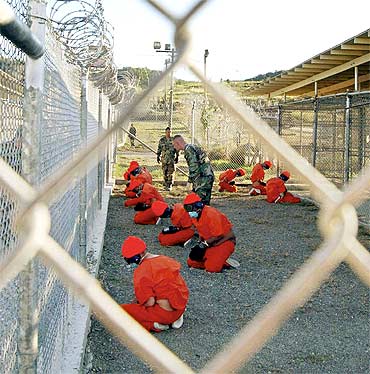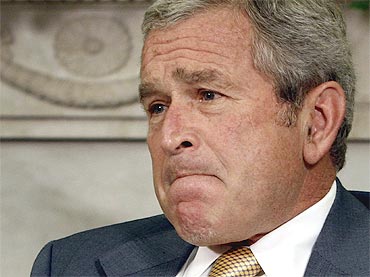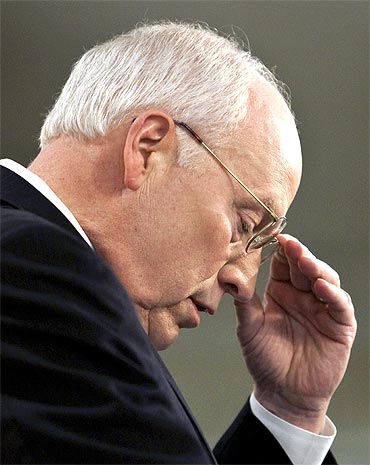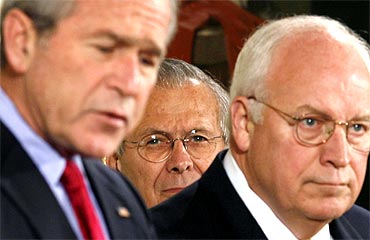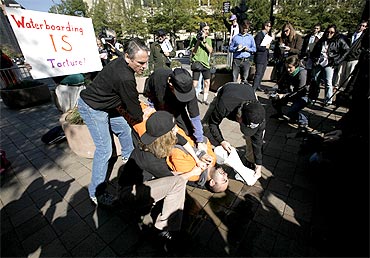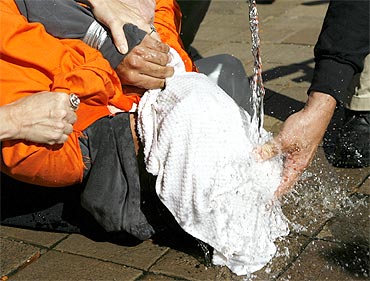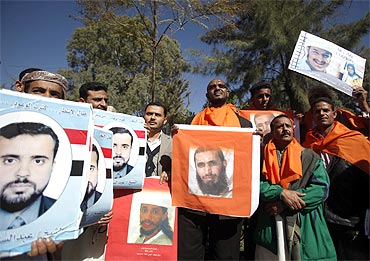 | « Back to article | Print this article |
'Bush, Cheney guilty of detainee abuse, torture'
Overwhelming evidence of torture by the George W Bush administration should compel United States President Barack Obama to order a criminal investigation into allegations of detainee abuse authorised by his predecessor and other senior officials, Human Rights Watch said in a report released on Tuesday.
The Obama administration has failed to meet US obligations under the Convention against Torture to investigate acts of torture and other ill-treatment of detainees, Human Rights Watch said.
The 107-page report, Getting Away with Torture: The Bush Administration and Mistreatment of Detainees, presents substantial information warranting criminal investigations of Bush and senior administration officials, including former Vice President Dick Cheney, Defense Secretary Donald Rumsfeld and Central Intelligence Agency Director George Tenet, for ordering torture practices such as "water-boarding," use of secret CIA prisons, and the transfer of detainees to countries where they were tortured.
Text: Vicky Nanjappa
'US has legal obligation to investigate these crimes'
"There are solid grounds to investigate Bush, Cheney, Rumsfeld, and Tenet for authorising torture and war crimes," said Kenneth Roth, executive director of Human Rights Watch.
"President Obama has treated torture as an unfortunate policy choice rather than a crime. His decision to end abusive interrogation practices will remain easily reversible unless the legal prohibition against torture is clearly re-established," said HRW.
If the US government does not pursue credible criminal investigations, other countries should prosecute US officials involved in crimes against detainees in accordance with international law, said Human Rights Watch.
"The US has a legal obligation to investigate these crimes," Roth said. "If the US doesn't act on them, other countries should."'US officials bent, ignored the rules'
In August 2009, US Attorney General Eric Holder appointed Assistant US Attorney John Durham to investigate cases of detainee abuse but limited the probe to "unauthorised" acts.
That meant the investigation could not cover acts of torture, such as waterboarding, and other ill-treatment authorised by lawyers if Bush administration, even if the acts violated domestic and international law.
On June 30, Holder accepted Durham's recommendation to carry out full investigations into two deaths in CIA custody, reportedly from Iraq and Afghanistan. Human Rights Watch said that the narrow scope of Durham's inquiry failed to address the systemic nature of abuses.
"The US government's pattern of abuse across several countries did not result from the acts of individuals who broke the rules," Roth said. "It resulted from decisions made by senior US officials to bend, ignore, or cast the rules aside."
'CIA director authorised use of waterboarding'
In citing the four top-level Bush administration officials, Human Rights Watch said that:
President Bush publicly admitted that in two cases he approved the use of waterboarding, a form of mock execution involving near-drowning that the United States has long prosecuted as a type of torture. Bush also authorised the illegal CIA secret detention and renditions programmes, under which detainees were held incommunicado and frequently transferred to countries such as Egypt and Syria where they were likely to be tortured.
Vice President Cheney was the driving force behind the establishment of illegal detention and interrogation policies, chairing key meetings at which specific CIA operations were discussed, including the waterboarding of one detainee, Abu Zubaydah, in 2002.
Defence Secretary Donald Rumsfeld approved illegal interrogation methods and closely followed the interrogation of Mohamed al-Qahtani, who was subjected to a six-week regime of coercive interrogation at Guantanamo that cumulatively appears to have amounted to torture.
CIA director Tenet authorised and oversaw the CIA's use of waterboarding, stress positions, light and noise bombardment, sleep deprivation, and other abusive interrogation methods, as well as the CIA rendition programme.
'Bush has sought to justify waterboarding'
In media interviews, Bush has sought to justify his authorisation of waterboarding on the ground that Justice Department lawyers said it was legal.
While Bush should have recognised that waterboarding constituted torture without consulting a lawyer, there is also substantial information that senior administration officials, including Cheney, sought to influence the lawyers' judgment, Human Rights Watch said.
"Senior Bush officials shouldn't be able to shape and hand-pick legal advice and then hide behind it as if it were autonomously delivered," Roth said.
The agency said the criminal investigation should include an examination of the preparation of the Justice Department memos that were used to justify the unlawful treatment of detainees.
Human Rights Watch also said that victims of torture should receive fair and adequate compensation as required by the Convention against Torture. Both the Bush and Obama administrations have successfully kept courts from considering the merits of torture allegations in civil lawsuits by making broad use of legal doctrines such as state secrets and official immunity.
'An independent, non-partisan commission needed'
An independent, non-partisan commission, along the lines of the 9-11 Commission, should be established to examine the actions of the executive branch, the CIA, the military, and the US Congress, with regard to Bush administration policies and practices that led to detainee abuse, Human Rights Watch said.
Such a commission should make recommendations to ensure that the systematic abuses of the Bush administration are not repeated.
In February 2011, Bush cancelled a trip to Switzerland, where alleged victims of torture had intended to file a criminal complaint against him. An investigation implicating US officials in torture is underway in Spain.
Documents made public by Wikileaks revealed that US pressure on Spanish authorities to drop the case has continued under the Obama administration.'Undermines US efforts for human rights'
Human Rights Watch said that the US government's failure to investigate US officials for the torture and ill-treatment of detainees undermines US efforts to press for accountability for human rights violations abroad.
"The US is right to call for justice when serious international crimes are committed in places like Darfur, Libya, and Sri Lanka, but there should be no double standards," Roth said.
"When the US government shields its own officials from investigation and prosecution, it makes it easier for others to dismiss global efforts to bring violators of serious crimes to justice," he said.
